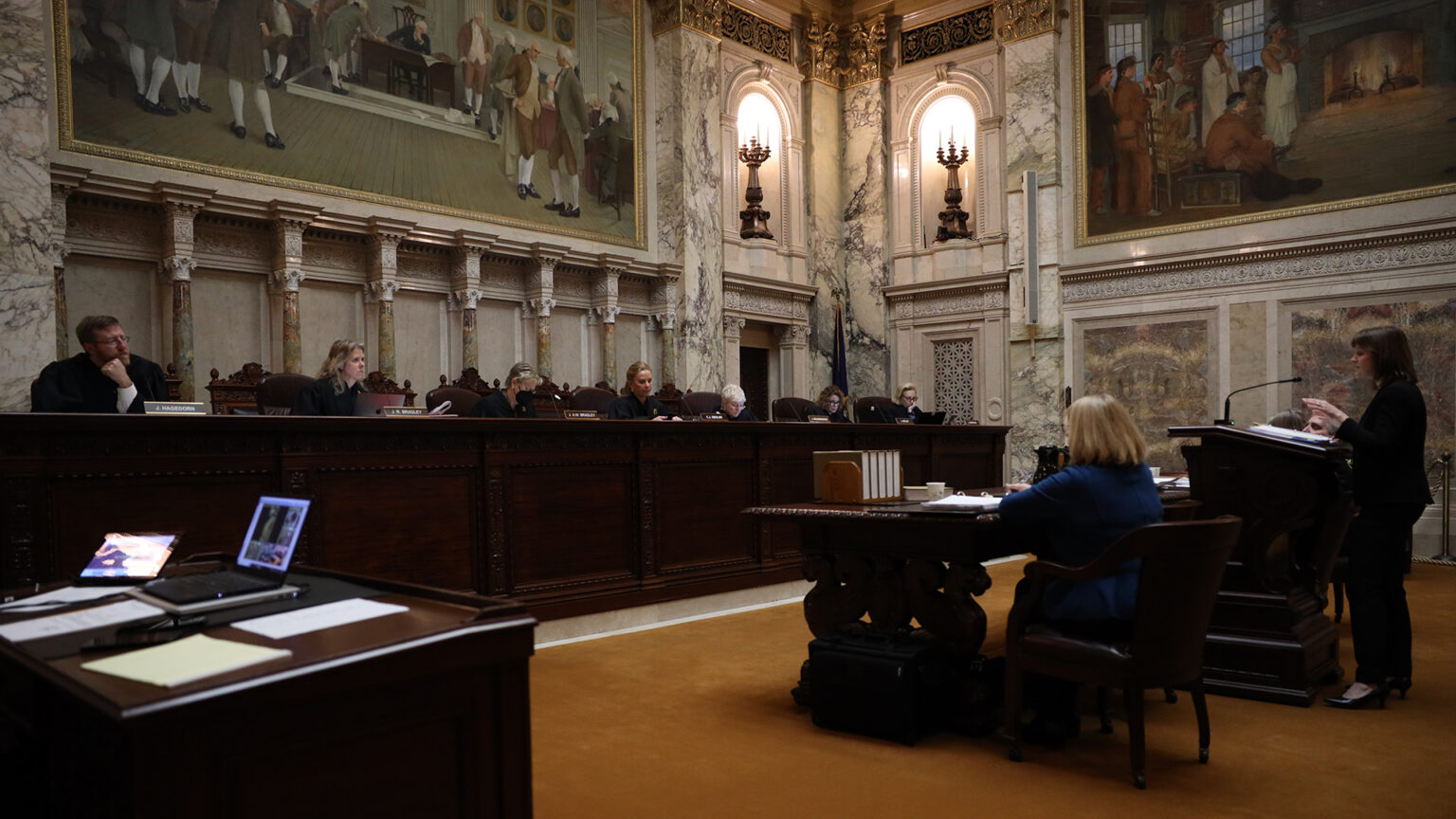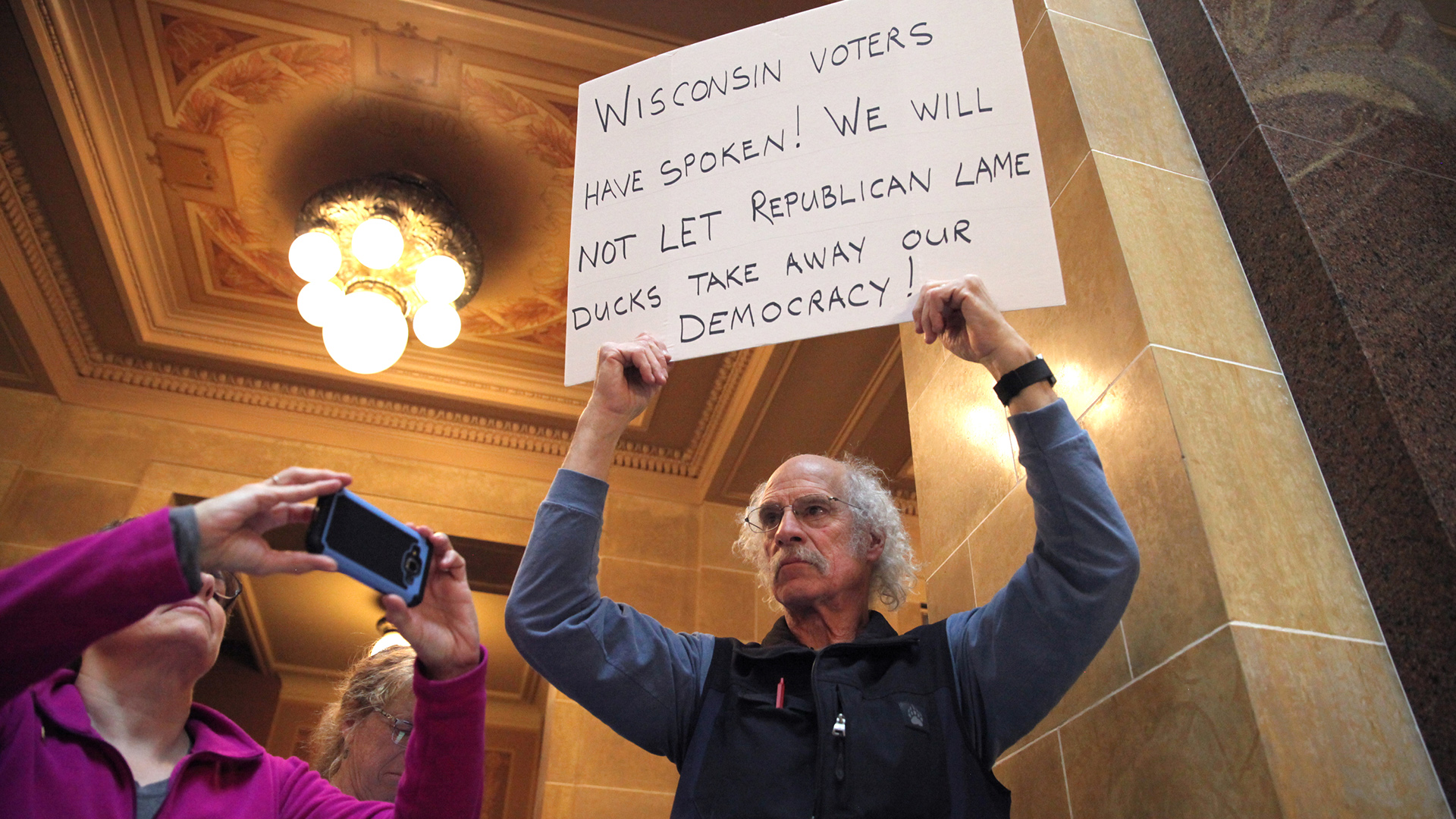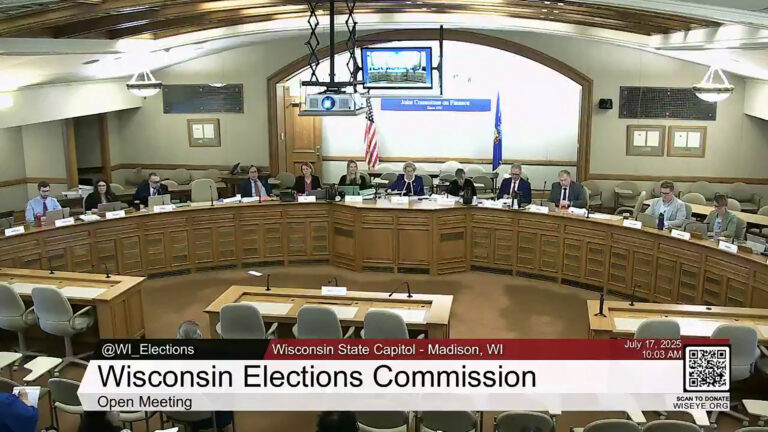Conservatives, liberals weigh in on Wisconsin Supreme Court 'activism'
The 2023 candidates for Wisconsin Supreme Court have accused each other of putting politics above the law — supporters point to cases that explain what that means.
Wisconsin Watch
March 30, 2023

The Wisconsin Supreme Court has grown increasingly fractured in recent years with the majority in many cases disagreeing on the legal basis for the outcome. (Credit: Coburn Dukehart / Wisconsin Watch)

One Supreme Court candidate calls his opponent a “liberal activist.” The other calls her opponent a “right-wing extremist.”
The mud-slinging heading into the April 4 Wisconsin Supreme Court election between former Justice Dan Kelly and Milwaukee County Circuit Court Judge Janet Protasiewicz is emblematic of the court’s bitter political divide over the past 20 years.
Since a similarly cantankerous Supreme Court election in 2008, conservatives have dominated the court. Prior to that, liberals issued several decisions that irked the state’s business interests, precipitating huge outside spending on what had previously been sleepy Supreme Court elections.
“What has become increasingly troubling is that over the past 15-plus years you started to get very conscious tribal definition by the justices,” said Ed Fallone, who has run twice for Wisconsin Supreme Court unsuccessfully as a judicial moderate. “When it’s open warfare on ideological lines and the tribal definitions get involved, that’s when national money starts flooding in because the tribe is national.”
To understand the origin of the political division on the court, it’s helpful to re-examine some of the cases each side views as judicial overreach.
Conservatives decry “liberal activism”
When conservatives talk about “liberal activism” they refer to several cases from the 2004-05 court term, which former Justice Diane Sykes referred to as “a watershed.” After Sykes was appointed to the 7th U.S. Circuit Court of Appeals, Democratic Gov. Jim Doyle appointed Louis Butler Jr., a former public defender and Milwaukee municipal judge.
Here are five of the cases conservatives pointed to:
In a 4-2 decision, the court ruled manufacturers could be held liable for injuries sustained by a child who had eaten lead paint chips in a Milwaukee house, even though the plaintiff couldn’t establish which company produced the lead or the paint.
Sykes called it “the most consequential common law decision” of the 2004-05 term and represented “a major reordering” of the tort system. Republicans undid the Thomas decision in 2011 through a sweeping tort reform bill.

Old, peeling paint as seen in this windowsill in a rental property in Milwaukee is often blamed for lead poisoning in children. The Wisconsin Supreme Court in 2005 expanded liability for lead paint poisoning to manufacturers, which conservatives called “liberal activism.” (Credit: Matt Campbell for Wisconsin Watch)
Ferdon v. Wis. Patients Comp. Fund
The case involved a newborn injured due to negligence. The child would require care for the rest of his life. The jury awarded $700,000 in damages for the injury and $403,000 for future medical expenses, which exceeded the state’s $350,000 cap on noneconomic damages approved by the Legislature.
The liberal majority in a 4-3 decision struck down the cap as a violation of the Wisconsin Constitution’s equal protection clause.
“After Ferdon, it is hard to imagine the statute that could not be a target for a successful equal protection challenge,” wrote Rick Esenberg, president of the conservative Wisconsin Institute for Law and Liberty.
Wischer v. Mitsubishi (Miller Park personal injury case)
In 1999, a crane collapsed in high winds at Miller Park, killing three workers. A jury awarded their widows $94 million in punitive damages, but an appellate court overturned the ruling, finding state law limited such damages to cases in which the defendant acted maliciously.
In a 5-1 decision, the high court reversed the appellate decision, applying a lower standard that the defendant disregarded the plaintiff’s rights. The parties later settled for $30 million.
After his election defeat in 2008, Butler said spending in the race by Wisconsin Manufacturers and Commerce, the state’s largest business lobby, sent a chilling message to judges to “not vote against business interests.” He referred to Thomas, Ferdon and Miller Park as decisions that caused WMC to deduce “that since my arrival on the court, our court’s decisions sometimes favored the consumer, and that was unacceptable.”
In a 2008 interview with Wisconsin Law Review, Jim Pugh of WMC called the cases “massive power grabs by the court,” and added, “there was a very robust debate about these cases, and his activist approach was repudiated by the voters.”
In a case involving a murder suspect, Matthew Knapp, police found the victim’s blood on Knapp’s sweatshirt in his apartment after he had invited in police, who did not issue a Miranda warning. The court in 2003 cited federal constitutional law in ruling that the sweatshirt evidence should be suppressed, finding that law enforcement violated the Knapp’s 5th Amendment protection against self-incrimination. But the U.S. Supreme Court later rejected that argument in a separate case. And after reviewing the Wisconsin case, it instructed the Wisconsin Supreme Court to reconsider its opinion under the state Constitution.
In this second review, the state Supreme Court again ruled in Knapp’s favor.
Conservatives said the expansion of a defendant’s state constitutional rights conflicted with a historical alignment of state and federal constitutional rights.
In his concurrence, Justice N. Patrick Crooks said the decision “serves to reaffirm Wisconsin’s position in the ‘new federalism’ movement,” which was a response among some in the legal community to an increasingly conservative U.S. Supreme Court.
In another case that Sykes considered part of the same “new federalism” movement, the court ruled 4-3 in a case involving a police procedure known as a “showup,” in which a suspect is presented to a victim, often at the crime scene. The court found that procedure unconstitutional, partly because of studies showing the unreliability of eyewitness testimony. Conservatives decried the decision for overturning U.S. Supreme Court precedent based on “social science.”
Notably, when Protasiewicz sought Republican Gov. Scott Walker’s appointment to be a Milwaukee County Circuit Court Judge in 2012, she mentioned the Dubose case as the worst Wisconsin Supreme Court decision in the previous 30 years.
Liberals point to string of conservative decisions
In 2008, Butler lost to Michael Gableman, and in 2010, Republicans swept into statewide office. The Legislature’s new GOP majority passed Act 10 under Walker, which reined in the power of public sector unions and helped re-elect Justice David Prosser in 2011 against a liberal challenger. When Crooks died in 2015, Rebecca Bradley was appointed to the court, solidifying a 5-2 conservative majority.
Mike Browne, deputy director of the liberal advocacy group A Better Wisconsin Together, pointed to several high-profile, controversial cases that reinforced Republican control. It’s unclear if the cases would be revisited should Protasiewicz win, giving liberals a majority.
“The larger point is that court majority matters, and the conservative court majority worked its will in ways that have significantly impacted the state,” Browne said.
Here are five of the cases Browne highlighted:
Madison Teachers Inc. v. Walker
Teacher unions in Madison and Milwaukee filed suit in August 2011 over Act 10, which among other things, barred most public employees from collective bargaining on issues other than “base wages.” Writing the majority opinion in the 5-2 ruling, conservative Justice Michael Gableman upheld Act 10 in its entirety, reversing a Dane County Circuit Court ruling.
Ascaris Mayo v. Wisconsin Injured Patients and Families Compensation Fund
Ascaris Mayo went to a Milwaukee emergency room in 2011 with abdominal pain and a high fever. A physician and physician’s assistant told her to see her gynecologist. The next day, she went to another emergency room and was diagnosed with sepsis from an untreated infection. Mayo subsequently suffered organ failure, and all four of her limbs had to be amputated. A jury awarded $16.5 million in noneconomic damages. But the 5-2 decision reduced the award to $750,000, citing the state’s malpractice cap, which the Legislature reinstated in 2006.
The decision effectively reversed the court’s 2005 decision in the Ferdon medical malpractice case.
“The Mayos certainly are very sympathetic plaintiffs because of the severe injuries that Ascaris Mayo has suffered,” Roggensack wrote for the majority. “However, were we to construe the cap based on our emotional response to her injury, we would be substituting our policy choice for that of the Legislature.”
Wisconsin Carry v. City of Madison
In 2005, Madison adopted a rule that prohibited passengers on its public bus service from bringing onboard “any items of a dangerous nature,” which included “pistols, rifles, knives or swords.”
Wisconsin Carry later asked the city to bring the rule in line with the 2011 law that allowed concealed carry in Wisconsin. The city refused, and Wisconsin Carry sued but lost at the circuit court and appellate level. The 5-2 opinion in 2017 tossed the city’s rule, saying it could not be enforced in light of the 2011 law.
League of Women Voters of Wisconsin v. Tony Evers
The League of Women Voters sued after the Legislature convened an extraordinary session in 2018 just before Walker left office. Republicans passed a number of bills to limit the powers of incoming Gov. Tony Evers and Attorney General Josh Kaul, both Democrats, including action on the state’s Voter ID law. The 4-3 opinion found the Legislature’s actions, which also included 82 appointments, was legal.

Bob Kinosian, from Wauwatosa, holds up a protest sign outside an extraordinary lame duck session of the Wisconsin Legislature on Dec. 4, 2018. Liberals point to the Supreme Court decision in League of Women Voters of “Wisconsin v. Tony Evers” as an example of the court’s conservative tilt. (Credit: Coburn Dukehart / Wisconsin Watch)
Tavern League of Wisconsin, Inc. v. Andrea Palm
The third of three Supreme Court decisions that struck down Evers’ pandemic-related restrictions. The 4-3 ruling found the restrictions needed to be passed as emergency rules, which require legislative approval. The specific order at issue limited bars and restaurants to 25% of their typical capacity. The Tavern League of Wisconsin argued the orders would cause “economic ruin” for bars and restaurants.
The nonprofit Wisconsin Watch collaborates with WPR, PBS Wisconsin, other news media and the University of Wisconsin-Madison School of Journalism and Mass Communication. All works created, published, posted or disseminated by Wisconsin Watch do not necessarily reflect the views or opinions of UW-Madison or any of its affiliates.
 Passport
Passport











Follow Us